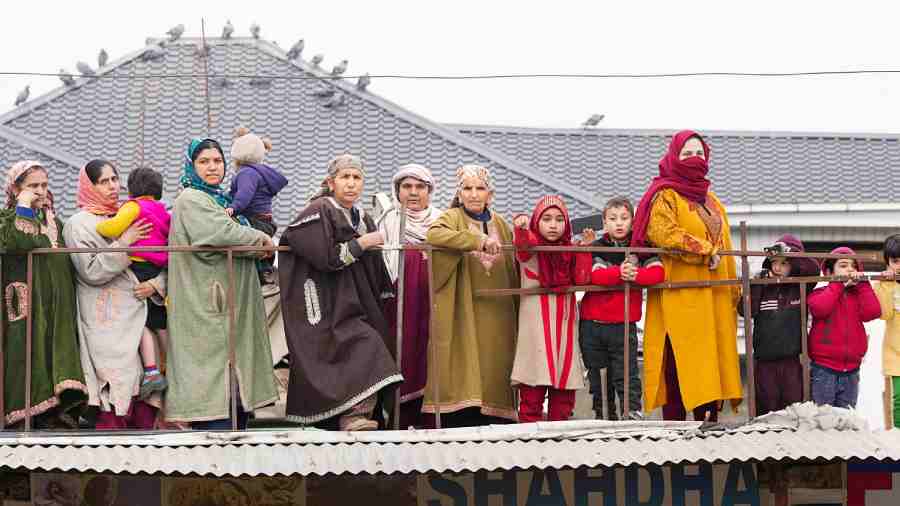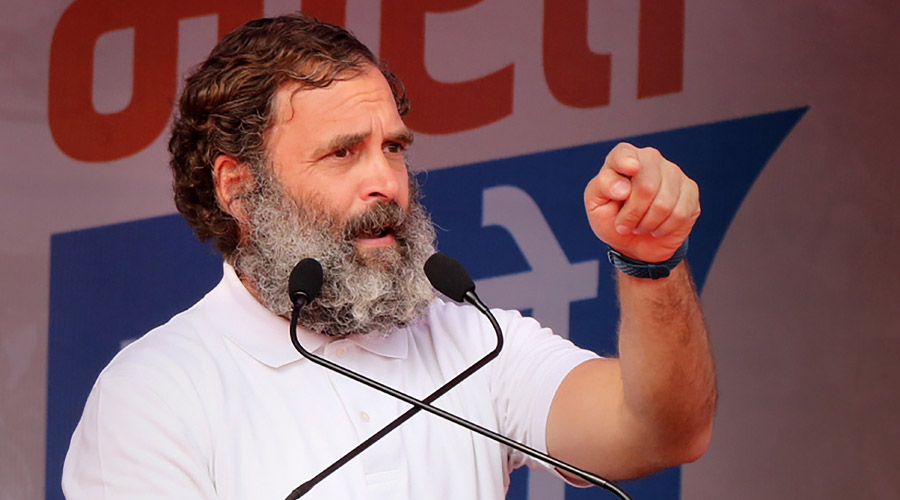Rahul Gandhi on Sunday followed in the footsteps of his great-grandfather Jawaharlal Nehru and hoisted the national flag in Srinagar’s Lal Chowk in an apparent bid to reclaim his legacy, the development capping his Bharat Jodo Yatra from Kanyakumari to Kashmir.
Hours later, the Congress leader set an innovative test for Union home minister Amit Shah to prove his claims of normality in Kashmir, daring the country’s second-most powerful man to take a leaf out of his book and walk from Jammu to Srinagar.
The nearly five-month-long Yatra, which has covered more than 3,500km, informally ended on Sunday when it entered Srinagar city, with thousands of Kashmiris rallying in support. The Congress will hold the grand finale on Monday with a public meeting, to which the leaders of many Opposition parties have been invited.
Rahul dismissed the Centre’s “all is well narrative” that claims that Kashmiris are happy with the dilution of Article 370 and the accompanying constitutional and legal changes, and that militancy has been contained.
“The targeted killings and bomb blasts are still going on,” Rahul told a news conference, replying to the question whether the government’s claim about an improved situation was true.
“If the situation is so good, why don’t BJP people do a yatra from Jammu to Lal Chowk? Why doesn’t Mr Amit Shah walk from Jammu to Kashmir if the situation is so secure? So I don’t think this argument holds.”
Rahul said he had not during his march from Jammu to Kashmir met a single person — Kashmiri, Dogra or Ladakhi — who was happy with what the Centre was doing. He said the slogan of “Naya Kashmir”, championed by the BJP, did not hold water.
“I was saddened when I walked through Jammu andKashmir as nobody is happy here, and Ladakh as well,” he said.
Earlier, in what seemed a sudden change of plans, Rahul had descended on Lal Chowk with sister Priyanka Gandhi Vadra and a few others amid tight security to unfurl the Tricolour at the landmark Ghanta Ghar clock tower.
Congress communications chief Jairam Ramesh said the party had initially applied for, and been denied, permission to hoist the Tricolour at Lal Chowk. “Last evening, we were told that we can go ahead with the Lal Chowk plan but on January 29,” he said.
Days earlier, Rajani Patil, the Congress’s minder for Jammu and Kashmir, had said that unfurling the national flag at Lal Chowk was part of the “RSS agenda”, which left many wondering about Sunday’s act.
A local Congress leader, however, said the Congress had a much older legacy than the BJP of hoisting the flag at the city centre. “Nehruji did it long back, much before the BJP tried to appropriate the place,” he said.
The BJP’s obsession with Ghanta Ghar, seen as ground zero of the Azadi movement, had begun in 1992 when party leader Murli Manohar Joshi launched his Ekta Yatra to Kashmir to hoist the national flag. Narendra Modi, then a small-time leader, was part of it.
The protagonists were airdropped in Srinagar after militants vowed to attack them, and the event was held amid massive security and a complete shutdown, with hardly any local Kashmiri joining in.
Rahul’s march, in contrast, has received huge support from a local population groaning under the government’s iron fist. Many here fear the government plans to change the demography of the region by settling outsiders.
In 1948, following the tribal raids from Pakistan, Nehru had unfurled the national flag at Lal Chowk in the presence of a large crowd led by then Jammu and Kashmir prime minister Sheikh Mohammad Abdullah.
Abdullah had expressed his support for Nehru through a famed Persian couplet: “Man tu shudam/ Tu man shudi/ Taqas na goyed/ Man degram tu degri (I became you/ You became me/ So, none can say/ We are separate).”
It was during this event that Nehru promised a plebiscite to Kashmiris, a legacy his party now finds difficult to defend.
During Sunday’s news conference, most of the questions Rahul faced were about his party’s stand on the restoration of Article 370. All he could offer was a fight for the restoration of statehood and the democratic process, and the assurance that this would be the “first step”.
On whether he was pained by his party’s broken promises to Kashmiris, made at Lal Chowk, he merely said he felt sad when he thought of the region.
“A strange idea came to my mind in Jammu, that my family descended from here and went to Allahabad and I am making the reverse journey. I felt I was going and that was a powerful feeling I had,” he said.
“I think I have affection towards the people of Jammu and Kashmir and I come here with an open heart and with open arms to help in whatever way I can.”
Rahul hit out at Prime Minister Modi over the India-China border standoff in Ladakh, saying the only way to deal with the Chinese was to “tell them firmly and clearly that they are sitting on our land which would not be tolerated”.
“The Prime Minister is the only person in the country who is under the impression that the Chinese have not taken any land from India,” he said. “I recently met some ex-army people and even some delegations from Ladakh who clearly said that 2,000sqkm of Indian territory has been taken away. Many of the patrolling points that used to be in Indian territory are now firmly in Chinese hands.”
Rahul said the RSS and the BJP were attacking the “institutional framework of the country, judiciary, media” and “what you see in Jammu and Kashmir is the same assault”.
He said the Yatra was the first step towards evolving a new political vision for the country. “Frankly, it was a small step. There are bigger steps in my mind,” he said.
He said nobody had expected “such a loving reception” to the Yatra across the country.











